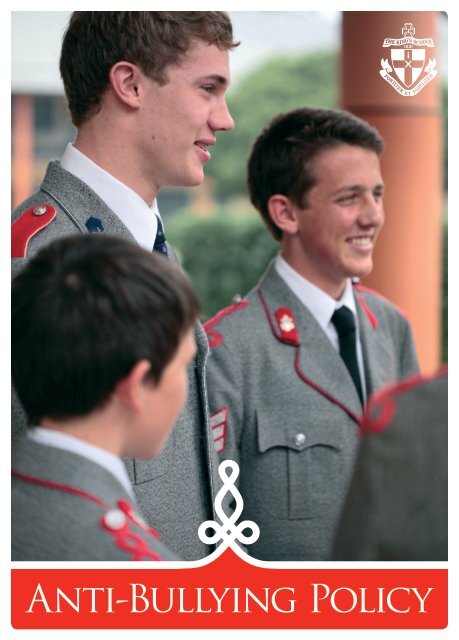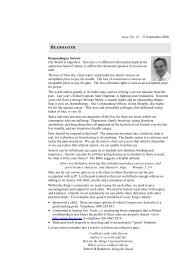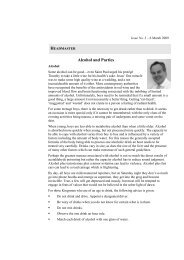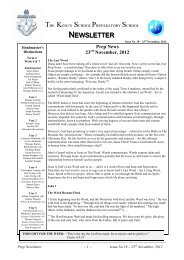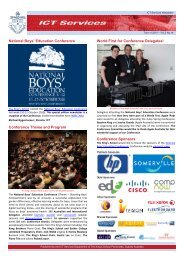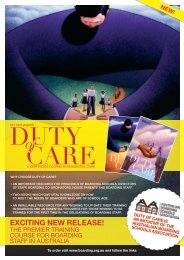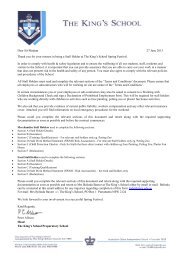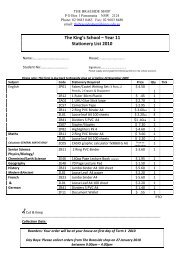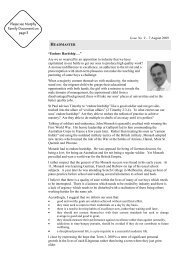Anti-Bullying Policy - The King's School
Anti-Bullying Policy - The King's School
Anti-Bullying Policy - The King's School
You also want an ePaper? Increase the reach of your titles
YUMPU automatically turns print PDFs into web optimized ePapers that Google loves.
<strong>Anti</strong>-<strong>Bullying</strong> <strong>Policy</strong>
<strong>The</strong> King’s <strong>School</strong><br />
anti-bullying policy<br />
has five sections:<br />
1 What is <strong>Bullying</strong> P3<br />
2 Cyber <strong>Bullying</strong> P4<br />
3 How does <strong>The</strong> King’s <strong>School</strong> discourage bullying P6<br />
4 What should you do if you are being bullied P8<br />
5 How to help a son who is being bullied P10<br />
Access to the<br />
<strong>Anti</strong>-bullying <strong>Policy</strong><br />
• <strong>The</strong> King’s <strong>School</strong> <strong>Anti</strong>-bullying policy can be viewed online.<br />
Go to www.kings.edu.au and follow the links.
01<br />
From<br />
What is <strong>Bullying</strong><br />
the<br />
Headmaster<br />
• <strong>Bullying</strong> is the deliberate intention to<br />
taunting and threats based on another<br />
harm someone who does not have the person’s race.<br />
power to stop it.<br />
- <strong>The</strong> causing of hurt by traditional<br />
methods such as punching, kicking<br />
• <strong>Bullying</strong>, harassment or any form of and spreading hurtful rumours, AND<br />
discrimination, is immoral and can <strong>The</strong> causing of hurt by contemporary<br />
be unlawful because it interferes with means such as cyber bullying,<br />
the right of a person to feel safe and sexting, engaging in identity theft<br />
valued as a member of a community. or by trashing someone on social<br />
networking sites.<br />
• <strong>Bullying</strong> takes many forms. It can be:<br />
- Face-to-face such as fighting, pushing, <strong>The</strong> key features of<br />
taunting, insulting, embarrassing, bullying are that it:<br />
intimidating and invading personal - causes hurt and distress,<br />
space, AND Behind-the-back such - is repeated,<br />
as writing threatening or offensive - involves the use of power in an<br />
messages, sending distressing emails unfair way.<br />
and writing anonymous notes that<br />
are hurtful.<br />
<strong>Bullying</strong> need not always be done by<br />
- Done individually such as a person the older or stronger. “<strong>Bullying</strong> up”<br />
mocking or teasing someone, AND is bullying done by the smaller, the<br />
It can be done as a group by such younger and the weaker, who either use<br />
means as social exclusion or hate anonymous means to bully, such as<br />
group recruitment.<br />
cyber bullying, or overt means to bully,<br />
- Physical, AND Psychological.<br />
knowing that any retaliation would make<br />
- Sexual harassment which involves the provoked person look like they are<br />
behaviours such as unwanted sexual the bully.<br />
touching, inappropriate joking,<br />
exposure, making sexual advances Symptoms of <strong>Bullying</strong><br />
or demeaning someone due to<br />
For behaviour to be classified as<br />
their sexual orientation, AND Racial bullying, it needs to involve repeated<br />
harassment which involves behaviours actions that are designed to cause hurt.<br />
such as social exclusion, teasing, Not having friends or not being popular<br />
<br />
isn’t necessarily a sign that a person<br />
is being bullied. It may simply mean<br />
a person lacks inter-personal skills.<br />
<strong>The</strong>re is a difference between bullying<br />
behaviour and what can be described as<br />
normal interpersonal conflict.<br />
<strong>The</strong> symptoms associated with<br />
bullying include, but are not limited to;<br />
not wanting to go to school, anger, tears,<br />
depression, low self-esteem and a raft<br />
of psychosomatic symptoms such as<br />
headaches and stomach aches. Bedwetting<br />
and sleeplessness can also be<br />
symptoms of bullying, particularly in the<br />
young. Withdrawal and reluctance to<br />
‘join in’ can be a warning sign, as can<br />
truancy, misbehaviour and aggressive<br />
behaviour. Cuts, bruising, torn clothing,<br />
requests for extra food or money as well<br />
as a decline in academic performance<br />
can also be clues that a student may be<br />
suffering from bullying.<br />
•<br />
Any form of bullying is unworthy<br />
of a Kingsman and against all<br />
that <strong>The</strong> King’s <strong>School</strong> stands for.<br />
Those who are identified as bullies<br />
will be dealt with firmly and may be<br />
expelled from the <strong>School</strong>.<br />
3
TKS<br />
<strong>Anti</strong>-<strong>Bullying</strong> <strong>Policy</strong><br />
02<br />
Cyber <strong>Bullying</strong><br />
From the<br />
Headmaster<br />
Cyber bullying is causing hurt via<br />
to depression, self-harm and even suicide.<br />
modern technologies such as the<br />
Internet and other forms of social media, Examples of Cyber bullying:<br />
and through the use of smart phones • Sending hateful or threatening<br />
and other mobile devices.<br />
comments or pictures via MSN, mobile<br />
Cyber bullying is a growing problem phone or the Internet and by social<br />
in society. Modern technologies<br />
networking sites such as MySpace<br />
empower the individual, even the most and Facebook.<br />
unlikely of individuals, with an immense • Using modern technologies to engage<br />
capacity to cause harm. It is also an in the social exclusion of someone and<br />
attractive means of bullying for it can, in hate group recruitment.<br />
under certain conditions, be carried out • Posting rude, explicit or embarrassing<br />
with relative anonymity.<br />
messages or pictures about someone<br />
Cyber bullying can be particularly on the Net.<br />
damaging because of the capacity it has • Stealing someone’s identity in order to<br />
to humiliate, hurt and harm a person in harm them in some way.<br />
front of a huge ‘audience’.<br />
• Putting pressure on a person to send<br />
A dangerous feature of cyber bullying revealing or compromising pictures of<br />
is that it can be done quickly and easily. themselves.<br />
On an impulse, a person can create • Covertly filming, recording or taking<br />
emotional havoc for another and do so a picture of someone and posting the<br />
before the voice of reason hints at the images on the Net to cause hurt.<br />
inappropriateness of the action.<br />
• ‘Outing’ and disseminating confidential<br />
A further problem with cyber bullying information about someone.<br />
is that the bully is often unaware of the • ‘Flaming’ and multi-messaging to clog<br />
extent of the harm they are causing up a person’s electronic system and to<br />
because cyber bullying seldom occurs cause them distress.<br />
face-to-face. <strong>The</strong> feedback is muted by • Using aliases and pseudonyms in chat<br />
•<br />
distance so that the bully is protected rooms and on social networking sites<br />
from an understanding of the awfulness in order to harass and upset.<br />
of their behaviour.<br />
• Engaging in cyber-stalking and the<br />
Cyber bullying represents unlawful invading of privacy.<br />
activity that may result in police laying • Referring to your school in a negative<br />
charges. Cyber bullying has been linked or disparaging way on the Net.<br />
4<br />
Sexting<br />
Another expression of cyber bullying is<br />
sexting.<br />
Sexting is taking sexually explicit<br />
photos and making them available for<br />
others to see via a carriage service such<br />
as mobile phone or computer.<br />
Sending explicit images of anyone,<br />
including yourself, is a crime if you are<br />
under the age of 18 years. If the person<br />
in the picture is under 16 years, it can be<br />
a very serious crime resulting in charges<br />
of paedophilia.<br />
Cyber anonymity<br />
Students need to remember that<br />
something sent electronically can never<br />
be entirely removed even with a press<br />
of the ‘delete’ button. <strong>The</strong> image may<br />
emerge at any stage in their future life<br />
and lead to serious consequences.<br />
Using pseudonyms, passwords and<br />
avatars does not protect the identity of a<br />
cyber bully. Technologies exist to identify<br />
those who mis-use modern technologies<br />
to harm others.<br />
Do not engage in cyber bullying.<br />
Do not post any image or comment<br />
that is designed to cause hurt. It is<br />
morally wrong and in many cases,<br />
it is also illegal.
StuDEnTS nEED To<br />
rememBEr THAT<br />
somETHInG SEnt<br />
elECTronICAlly CAn<br />
never BE EnTIrely removED<br />
even WITH A PrESS of THE<br />
‘DElETE’ BuTTon.<br />
It should also be noted that even if<br />
cyber bullying is engaged in while not at<br />
school, the matter will be taken up by the<br />
<strong>School</strong> because the moral welfare of its<br />
students is of importance to <strong>The</strong> King’s<br />
<strong>School</strong> as is anything that brings the<br />
<strong>School</strong> into disrepute.<br />
Students can protect themselves from<br />
some forms of cyber harm by noting<br />
the following advice:<br />
1. Never tell anyone, even your friends,<br />
your passwords, private details or<br />
access codes.<br />
•<br />
2. When speaking to someone you do<br />
not know on the Net, be aware they<br />
may not be who they say they are.<br />
3. Be aware that there are predators who<br />
use the internet to lure young people<br />
the Net is for illegal activities such as<br />
scams, pornography and gambling.<br />
Finally, if you find yourself the victim of<br />
cyber bullying, keep the evidence and<br />
report the bullying to an appropriate<br />
adult. It is generally best not to respond<br />
to the cyber bully, or give them any<br />
satisfaction they have caused you hurt.<br />
If you do respond to the bully, do not do<br />
so while hot with anger. This can result in<br />
mutual cyber bullying which means both<br />
parties become guilty of bullying.<br />
One’s “digital footprint” may be<br />
accessed many years after material<br />
is posted online and used by<br />
others, eg. prospective employers<br />
and the media.<br />
into inappropriate sexual relationships.<br />
Others use tricks, such as pretending<br />
to be a bank, to get the victim to share<br />
their confidential financial details. This<br />
usually results in identity fraud and the<br />
stealing of money.<br />
4. Never tell people you do not know well<br />
what your address is, or how they can<br />
meet up with you.<br />
5. Always be careful what you say or<br />
what you show a person in confidence<br />
on the Net for it is never guaranteed to<br />
remain confidential. <strong>The</strong> information<br />
may be sent on to others.<br />
6. Know that the most frequent use of<br />
5
TKS<br />
<strong>Anti</strong>-<strong>Bullying</strong> <strong>Policy</strong><br />
03<br />
From the<br />
Headmaster<br />
How does <strong>The</strong> King’s <strong>School</strong> discourage bullying<br />
<strong>Bullying</strong> is totally against the mission<br />
student diaries and on the <strong>School</strong>’s<br />
and purpose of <strong>The</strong> King’s <strong>School</strong>.<br />
website.<br />
<strong>The</strong> <strong>School</strong> is committed to providing • Promoting a bully-free environment in<br />
an educational environment in which assemblies, chapel, tutor periods, Yearlevel<br />
students feel valued and secure. To<br />
meetings and House meetings.<br />
achieve this end, the <strong>School</strong> will seek to • Promoting a bully-free environment in<br />
create a school-wide culture that:<br />
the staff handbook, in <strong>School</strong> policy<br />
• Allows students to flourish free from documents and in occasional articles in<br />
discrimination, harassment or any publications such as <strong>The</strong> King’s Herald.<br />
form of bullying.<br />
• Promoting a bully-free environment in<br />
• Does not tolerate, condone or trivialise PDHPE classes.<br />
bullying behaviours.<br />
• Undertaking confidential Year-level<br />
• Is aware of what constitutes bullying surveys of student well-being and<br />
behaviour.<br />
bullying behaviour and following up on<br />
• Provides support to the victims of identified bullies and victims.<br />
bullying.<br />
• Undertaking House surveys on boarder<br />
• Deals firmly with bullies so that they well-being.<br />
either stop their bullying or leave • Designing an online assessment of a<br />
the <strong>School</strong>.<br />
student’s personal feelings related to<br />
bullying.<br />
<strong>The</strong> methods used by the <strong>School</strong> to • Conducting exit interviews.<br />
discourage bullying will vary from • Ensuring effective pastoral support for<br />
time-to-time, with new initiatives being students through the appointment of<br />
introduced when thought appropriate. Tutors, Year-level Co-ordinators and<br />
<strong>The</strong> measures that have been used to Housemasters.<br />
discourage bullying at <strong>The</strong> King’s <strong>School</strong> • Incorporating instruction about the<br />
include, but are not limited to:<br />
<strong>School</strong>’s anti-bullying stance in the<br />
• Employing a suitable range of<br />
Learning Leadership tutorial material<br />
sanctions to deal with and discourage used by students in Years 8-11.<br />
bullies. <strong>The</strong>se sanctions include • Incorporating anti-bullying guidelines<br />
suspension and expulsion.<br />
in the Preparatory <strong>School</strong>’s code of<br />
• Putting up signage about the <strong>School</strong> behaviour for students and in their<br />
to promote a bully-free environment. statement of students’ rights and<br />
• Printing anti-bullying policies in<br />
responsibilities.<br />
6<br />
• Incorporating anti-bullying guidelines<br />
in the Duty of Care training program for<br />
boarding staff.<br />
• Employing Chaplains and <strong>School</strong><br />
Counsellors who have specialist skills<br />
in helping both victims of bullying and<br />
identified bullies.<br />
• Having a prefectorial team who support<br />
the <strong>School</strong>’s anti-bullying policy and<br />
who students feel free to inform about<br />
any bullying.<br />
• Instituting a “Captain’s Court” to<br />
deal with grievances that students<br />
want handled by their peers rather<br />
than by staff.<br />
• Instituting a Student Support Team<br />
to monitor the well-being of students<br />
at risk.<br />
• Training staff to detect bullying<br />
behaviours.<br />
• Encouraging staff to adopt classroom<br />
management techniques that discourage<br />
opportunities for bullying behaviours.<br />
• Employing staff who model tolerance,<br />
empathy and acceptance of individual<br />
differences.<br />
• Encouraging staff to take their<br />
supervision duties seriously so that<br />
there is a pervasive sense of staff<br />
presence when on duty.<br />
• Reviewing the <strong>School</strong>’s anti-bullying<br />
policy from time-to-time, in order<br />
to ensure that it remains effective<br />
and relevant.
<strong>The</strong> effectiveness of these strategies<br />
rests with ALL members of the <strong>School</strong>’s<br />
community.<br />
To assist the Headmaster to assess<br />
the success or otherwise of the antibullying<br />
strategies being pursued, an<br />
“Annual Report on <strong>Bullying</strong> at <strong>The</strong> King’s<br />
<strong>School</strong>” will be prepared that summarises<br />
the quantitative data drawn from records<br />
kept and surveys undertaken at the<br />
<strong>School</strong>. <strong>The</strong> Annual Report will contain<br />
a section on the conclusions that can<br />
be drawn from that data along with<br />
comparisons against previous years’<br />
conclusions to enable an understanding<br />
as to whether bullying is being reduced or<br />
is increasing.<br />
To assist the Headmaster in preparing<br />
the Annual Report on bullying, the<br />
<strong>School</strong>’s Student Support Team will have<br />
their responsibilities expanded to include<br />
the preparation of that Annual Report.<br />
<strong>The</strong> Team will also be responsible for<br />
reviewing anti-bullying measures and<br />
making recommendations to amend<br />
these with the aim of reducing instances<br />
of bullying.<br />
<strong>The</strong> Student Support Team is<br />
Chaired by the <strong>School</strong> Chaplain and will<br />
be comprised of representatives from the<br />
<strong>School</strong>’s Pastoral Support Service areas,<br />
the Senior <strong>School</strong> and the Preparatory<br />
<strong>School</strong>. <strong>The</strong> Team will be assisted by<br />
the Deputy Bursar in preparing the<br />
Annual Report, which will be submitted<br />
to the <strong>School</strong> Council each year.<br />
•<br />
<strong>The</strong> King’s <strong>School</strong> reserves the<br />
right to alter the means and ways<br />
by which it discourages bullying.<br />
If any should like to suggest an<br />
improvement in the way bullying<br />
might be discouraged at <strong>The</strong> King’s<br />
<strong>School</strong>, they are invited to send<br />
their suggestions to the Deputy<br />
Headmaster or the Head of the<br />
Preparatory <strong>School</strong>.<br />
an “Annual rEPorT on<br />
BullyinG AT THE King’s<br />
SCHool” WIll BE PrEPArED<br />
summarISInG THE<br />
quanTITATIvE DATA DrAWn<br />
from rECorDS KEPT And<br />
surveyS unDErTAKEn<br />
AT THE SCHool.<br />
7
TKS<br />
<strong>Anti</strong>-<strong>Bullying</strong> <strong>Policy</strong><br />
04<br />
From the<br />
Headmaster<br />
What should you do if you are being bullied<br />
If you are being bullied, it is important<br />
that you talk to an adult who is in a<br />
position to help you.<br />
8<br />
<strong>The</strong>re can be a reluctance to report<br />
bullying because of a fear of being labelled<br />
a ‘dobber’ and going against an unwritten<br />
code of student behaviour. This concern<br />
is understandable but must not prevent<br />
you from reporting bullying behaviour.<br />
Most students dislike bullying and would<br />
support your attempts to stop it.<br />
Some students may not want to<br />
report bullying because they feel it<br />
might only make matters worse. Again,<br />
this fear is understandable, but most<br />
teachers are trained in ways to help<br />
victims of bullying in a manner that<br />
protects the victim.<br />
•<br />
It can take courage to challenge the<br />
bully, to expose them for who they<br />
are and to play a part in improving our<br />
community by ridding it of bullying<br />
behaviour. <strong>The</strong> King’s <strong>School</strong> expects<br />
its students to show this courage and<br />
not tolerate bullying as a bystander or<br />
as a victim.<br />
Our school motto “fortiter et<br />
fideliter” means “bravely and<br />
of Kingsmen – that they be brave and<br />
faithful in getting rid of any bullying<br />
they encounter. Everyone at <strong>The</strong><br />
King’s <strong>School</strong> should be committed to<br />
making the <strong>School</strong> a safe and happy<br />
community.<br />
If you are being bullied, you must<br />
tell a responsible adult who has the<br />
capacity to help. options include:<br />
- Parents, guardian or adult relatives.<br />
- Teacher, Coach, Housemaster, Year<br />
Coordinator, Tutor.<br />
- Counsellor, Chaplain.<br />
- Headmaster, Deputy Headmaster,<br />
Head of the Preparatory <strong>School</strong> or any<br />
member of the <strong>School</strong> Executive.<br />
Others who can be informed include:<br />
- Monitors, Prefects, House or <strong>School</strong><br />
Captain.<br />
- Doctor or Nurse at the <strong>School</strong>’s Health<br />
Centre.<br />
- Matron.<br />
If needed, further help can be<br />
obtained from:<br />
- Kids Helpline – 1800 551 800<br />
- Lifeline – 131 114<br />
faithfully” and that is what is expected<br />
•<br />
- Salvo Youth Line – 9360 3000<br />
- Websites:<br />
• www.bullyingnoway.com.au<br />
• www.kidshelp.com.au<br />
REMEMBER<br />
<strong>The</strong> King’s <strong>School</strong> is committed to<br />
providing a safe and happy learning<br />
environment. <strong>The</strong>refore, the <strong>School</strong>
IT CAn TAKE CourAGE To<br />
challenGE THE Bully,<br />
to expoSE THEm for WHo<br />
they ArE AnD To Play A<br />
parT In ImprovinG our<br />
communITy By rIDDInG IT<br />
of BullyinG BEHAviour.<br />
will be pleased to know if there are<br />
any bullying behaviours that are<br />
undermining this goal.<br />
If you are being bullied, you are<br />
encouraged to do the rITE thing:<br />
r = rECOGNISE<br />
you have the right to feel safe and<br />
to operate in an environment free of<br />
bullying.<br />
I = Inform<br />
the bullies that you want them to stop.<br />
Do this in a polite but firm way.<br />
T = TEll<br />
a responsible adult about the bullying.<br />
E = EVAluATE<br />
the situation. If it does not improve, seek<br />
further help.<br />
• When bullied, try not to get angry or<br />
show that you are angry. If your anger<br />
is obvious, the bully has the satisfaction<br />
of knowing that they have controlled<br />
your emotions.<br />
• Admit to imperfections. It can send<br />
positive messages about you having a<br />
realistic understanding of yourself.<br />
• Use non-offensive humour. <strong>Bullying</strong><br />
can be blunted by a good laugh. <strong>The</strong><br />
capacity to laugh at yourself can<br />
create a bonding with a group that might<br />
otherwise remain hostile.<br />
• Review your own behaviours and body<br />
language. If you look like a victim you can<br />
become a victim. Squared shoulders and<br />
a smile can do much to deter a bully.<br />
• Avoid trouble spots. <strong>The</strong>re are always<br />
places that are high-risk areas for<br />
bullying. Avoid them.<br />
• Develop your ‘emotional quotient’. This<br />
includes the ability to read body language,<br />
to sense mood, to be intuitive and<br />
empathetic. Such skills not only make<br />
you less of a target, they can enable you<br />
to see where a situation may be heading.<br />
Early detection of possible bullying can<br />
provide options for avoiding it.<br />
• Surround yourself with good friends.<br />
Those with strong friendships are usually<br />
less of a target for bullies.<br />
• If bullied, try not to retaliate for this can<br />
often inflame the situation.<br />
• If you are being bullied, remind yourself<br />
that it is the bully who has the problem,<br />
not you. Try to think through what<br />
inadequacies the bully might have<br />
that causes them to behave this way.<br />
Understanding a bully is a great way to<br />
begin to solve the problem.<br />
Don’t be a victim<br />
Victims can attract bullying behaviour.<br />
This is not to excuse bullying or condone<br />
it in any way. It is to suggest that victims<br />
can sometimes reduce their chances of<br />
being a target if they:<br />
• Maintain good self-esteem.<br />
• Work on fitting in, getting involved<br />
and making a rich contribution to the<br />
<strong>School</strong>.<br />
• Model kindness, thoughtfulness and<br />
respect.<br />
• Don’t catastrophise situations out of<br />
all proportion.<br />
• Develop an ability to deal with:<br />
- Failure and success<br />
- Threats and fear<br />
- Rejection and disappointment<br />
- Anger and hurt<br />
• Try and maintain good physical fitness,<br />
it can help with resilience.<br />
Having noted the above, it is vital that<br />
anyone who is a victim of bullying<br />
recognise that they have been wronged.<br />
<strong>The</strong>y must report the matter and not<br />
suffer in silence.<br />
If you ARE BEING BullIED<br />
TEll SomEonE.<br />
9
TKS<br />
<strong>Anti</strong>-<strong>Bullying</strong> <strong>Policy</strong><br />
05<br />
From the<br />
Headmaster<br />
How to help a son who is being bullied<br />
Introduction<br />
<strong>The</strong>re are a number of things parents<br />
<strong>The</strong> most important thing a parent can can do to reduce the chances of their<br />
do to help a son who is being bullied is son being bullied. <strong>The</strong>se include:<br />
to provide love and reassurance and to • Developing their son’s ‘emotional<br />
support them in their quest to solve the quotient’ (EQ). Sons who have been<br />
problem. A report of bullying by a son brought up without many brothers<br />
should always be taken seriously.<br />
and sisters, or who spend a lot of<br />
Parents can take comfort that the time playing alone in front of the TV<br />
bully-free world they want for their son or computer screen, may need extra<br />
is also wanted by the <strong>School</strong>. <strong>The</strong>refore, training in how to deal with the bumps<br />
parents are invited to contact the <strong>School</strong> and bruises of living in a community<br />
should they become aware that their son with others. <strong>The</strong>y need to be trained in<br />
is being bullied. <strong>The</strong> <strong>School</strong> appreciates behaviours that others find attractive.<br />
being able to partner with parents in <strong>The</strong>y need to learn the social graces<br />
solving bullying problems.<br />
of sharing and of adapting behaviours<br />
that are appropriate to an occasion.<br />
Finding out<br />
This is particularly true of some<br />
Sometimes, a son can be reluctant to tell cultures who may not fully understand<br />
their parents that they are being bullied. the behavioural codes thought<br />
Creating a culture of openness within attractive to the predominant culture<br />
the home can help. Solutions can be as of the <strong>School</strong>.<br />
simple as having evening meals together, • Teaching their son how to react when<br />
without the distraction of the television, they are being bullied. <strong>The</strong> main<br />
and making it a regular habit to enquire message is that:<br />
how a son is feeling.<br />
THEy muST TEll SomEonE<br />
It can be useful to use an intermediary • Instituting good management systems<br />
such as an older sibling, grandparent or in the home that monitor the presence,<br />
close friend in order to find out if a son is or otherwise, of cyber bullying. This<br />
being bullied. Use can also be made of includes, but is not limited to:<br />
the family doctor, child psychologist or - Making sure their son knows about the<br />
<strong>School</strong> counsellor.<br />
various forms of cyber bullying and<br />
how to identify them.<br />
What can parents do to reduce the - Reminding sons not to share personal<br />
chances of their son being bullied details, passwords, security or access<br />
10<br />
information with anyone, even their<br />
closest friends.<br />
- Advising their son that if they suffer<br />
from cyber bullying, to save the<br />
information and report it to the proper<br />
authorities.<br />
- Becoming more computer literate and<br />
knowing about such things as privacy<br />
settings and net filters.<br />
- Occasionally Googling their son’s<br />
name to see what is being posted<br />
about him online.<br />
- Encouraging their son to conduct<br />
himself properly in “Cyberia” and to<br />
ensure that his “digital footprint” is one<br />
he, and his parents, would be proud of.<br />
- Reminding their sons of the deceit and<br />
scams that are prevalent on the Net.<br />
- Encouraging computer use in an open<br />
family area, so that there is effective<br />
monitoring of online activity.<br />
• Partnering with the <strong>School</strong>. When<br />
some parents hear that their son<br />
has been bullied they can get very<br />
angry. This is entirely understandable.<br />
However, this anger can become<br />
destructive if it spills over and alienates<br />
those agencies that can help, such as<br />
the <strong>School</strong>. <strong>The</strong> King’s <strong>School</strong> abhors<br />
bullying and, as shown in Section 3 of<br />
the <strong>School</strong>’s anti-bullying policy, takes<br />
active steps to try and reduce bullying.<br />
• Avoiding over-protective parenting.<br />
Most King’s parents are wonderful
For younGEr CHIldren,<br />
knoW your CHIld’s<br />
PASSWorD And<br />
oCCASIonally monITor<br />
his soCIAl nETWorKIng<br />
SITES. THEy SHoulD BE<br />
awarE you WIll Do So.<br />
at parenting. However, a few parents<br />
engage in over protection<br />
or ‘helicopter parenting’. <strong>The</strong>se<br />
parents can be difficult to work with<br />
as they are prone to ‘bubble wrapping’<br />
their son and to catastrophising hurt.<br />
Sons readily pick up on this behaviour<br />
and can become adept at feeding<br />
their parents yet more tales of horror<br />
to gain extra sympathy and attention.<br />
• Avoiding premature judgement.<br />
Sometimes parents will react angrily<br />
to facts reported by their son, but on<br />
investigation by the <strong>School</strong>, these<br />
‘facts’ are sometimes not accurate.<br />
It is wise to test facts before making found at:<br />
judgements.<br />
•<br />
• Being patient. <strong>The</strong> <strong>School</strong> is<br />
committed to investigating a bullying<br />
allegation in a manner that protects the<br />
rights of all involved, including the bully.<br />
This is not the <strong>School</strong> failing to take<br />
immediate action to punish someone,<br />
it is the <strong>School</strong> exercising procedural<br />
fairness. It is also important to let the<br />
<strong>School</strong> look into the matter rather than<br />
challenging the bully directly, or the<br />
parents of the bully.<br />
• For younger children – know your<br />
child’s password and occasionally<br />
monitor social networking sites.<br />
<strong>The</strong>y should be aware you will do so.<br />
• Being supportive. Dealing with a son<br />
who is a bully can be particularly<br />
difficult for a parent. Some will<br />
support the <strong>School</strong>, others will not<br />
and will sometimes exhibit those same<br />
behaviours that have landed their son<br />
in trouble as a bully. On the other side<br />
of the equation are parents that are<br />
outraged because their son has been<br />
bullied. This can lead to the <strong>School</strong><br />
being sandwiched between two<br />
sets of angry parents. Support and<br />
understanding is sought from parents<br />
of alleged bullies and alleged victims<br />
when the <strong>School</strong> is investigating an<br />
accusation of bullying.<br />
• resources about bullying can be<br />
- www.ncab.org.au<br />
(National Centre Against <strong>Bullying</strong>)<br />
- www.bullyingnoway.com.au<br />
- www.cybersmart.gov.au<br />
- www.kidshelp.com.au<br />
Further advice on this topic is to be<br />
found in the information in Section 4<br />
of the <strong>School</strong>’s anti-bullying policy,<br />
titled: ‘What should you do if you are<br />
being bullied’<br />
Finally<br />
<strong>The</strong> King’s <strong>School</strong> is committed to<br />
providing a safe and secure environment<br />
for its students. In order to achieve<br />
this end, the <strong>School</strong> will review its antibullying<br />
policies and procedures from<br />
time to time. If there are any within<br />
<strong>The</strong> King’s community who would like<br />
to recommend improvements to the<br />
<strong>School</strong>’s anti-bullying policy, you are<br />
welcome to send your ideas to the<br />
Deputy Headmaster or the Head of the<br />
Preparatory <strong>School</strong>.<br />
Dr Tim Hawkes<br />
Headmaster<br />
11
THE KING’S SCHOOL<br />
ACADEMIC EXCELLENCE WITH CHARACTER DEVELOPMENT<br />
www.kings.edu.au, (02 9683 8555)<br />
Pennant Hills Road, North Parramatta NSW<br />
PO Box 1 Parramatta NSW 2124<br />
Cricos No: 02326F ABN: 24 481 364 152<br />
THE KING’S SCHOOL<br />
ACADEMIC EXCELLENCE WITH CHARACTER DEVELOPMENT<br />
www.kings.edu.au, (02 9683 8555)<br />
Pennant Hills Road, North Parramatta NSW<br />
PO Box 1 Parramatta NSW 2124<br />
Cricos No: 02326F ABN: 24 481 364 152


